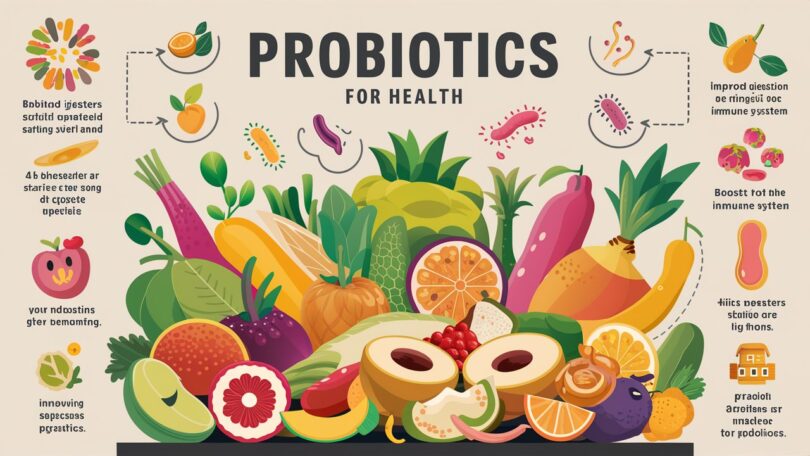Unlocking the Power of Probiotics for Your Health
Welcome to our expert guide on the incredible benefits of probiotics for your well-being. As someone deeply immersed in this field, I am thrilled to share with you all the essential insights you need to know about probiotics and how they can revolutionize your health.
Probiotics are live microorganisms that offer a plethora of health advantages when consumed in adequate quantities. These beneficial bacteria and yeasts can be naturally found in certain foods or taken as supplements. They function by restoring and maintaining a harmonious balance of microbes in your gut, crucial for optimal digestion and immune resilience.
The Science Behind Probiotics
Welcome to the world of probiotics, where beneficial microbes work wonders for your health, particularly in supporting your digestive system. As an expert in this field, I am excited to share with you the fascinating science behind these tiny but mighty organisms.
Varieties of Microbes Involved
Probiotics come in a variety of strains, each with its unique benefits:
- Lactobacillus: Known for its presence in yogurt and other fermented foods, this strain aids in lactose digestion and lactic acid production.
- Bifidobacterium: Abundant in the intestines, these probiotics play a crucial role in maintaining gut health.
- Saccharomyces boulardii: This yeast-based probiotic has shown promise in alleviating diarrhea symptoms caused by antibiotics or infections.
Scientific Backing for Probiotics
Research has consistently shown that incorporating probiotics into our daily routine can have numerous positive effects:
- Enhanced Digestive Health: Probiotics help break down food efficiently and promote regular bowel movements.
- Strengthened Immune Function: By nurturing a healthy gut microbiota, probiotics support a robust immune response against harmful pathogens.
- Relief from Irritable Bowel Syndrome (IBS): Specific strains like Bifidobacterium infantis have been effective in reducing IBS symptoms such as bloating and abdominal pain.
- Prevention of Antibiotic-associated Diarrhea: Taking probiotics alongside antibiotics can prevent diarrhea often associated with their use.
Unveiling Gut Microbiota
The human gastrointestinal tract is home to trillions of microorganisms collectively known as the gut microbiota. These microbes are essential for overall health and well-being. Probiotics introduce beneficial bacteria to maintain a diverse and balanced gut microbiota.
Choosing Quality Probiotic Products
When selecting probiotic supplements or fermented foods, opt for high-quality products containing viable bacterial strains at adequate levels. Look for reputable brands that undergo rigorous testing to ensure potency and safety.
The Power of Probiotics for Your Health
Welcome to the world of probiotics, where beneficial bacteria work wonders for your well-being. As someone deeply immersed in the realm of gut health, I am excited to share with you the incredible benefits that probiotics can offer. Let’s dive into some key ways these tiny microbes can revolutionize your health:
Optimal Digestive Wellness
Probiotics are essential for maintaining a happy gut. By aiding in food breakdown and nutrient absorption, they support smooth digestion and alleviate common issues like bloating and constipation.
Strengthened Immune System
Believe it or not, a significant portion of our immune defenses resides in our intestines! Probiotics boost immunity by enhancing antibody production and activating immune cells, reducing the risk of infections and allergies.
Relief from Irritable Bowel Syndrome (IBS)
For those battling IBS symptoms like abdominal pain and diarrhea, certain probiotic strains such as Bifidobacterium infantis can provide much-needed relief.
Defense Against Vaginal Infections
Ladies, rejoice! Lactobacillus-containing probiotics help maintain vaginal balance by creating an unfriendly environment for harmful pathogens responsible for pesky infections.
Mental Well-Being Support
The gut-brain connection is real! Emerging research shows that probiotics can positively impact mental health by influencing neurotransmitter production, potentially easing anxiety and depression symptoms.
Improved Nutrient Utilization
Probiotics aid in breaking down nutrients from food so your body can absorb them more effectively – ensuring you get maximum benefit from what you eat.
Oral Health Maintenance
Certain probiotic strains combat dental issues like cavities and gum disease while promoting a healthy oral microbiome balance – keeping your smile bright!
Weight Management Assistance
While not a quick fix for shedding pounds, studies suggest that specific probiotic strains may complement weight management efforts when paired with a balanced diet and exercise routine by regulating appetite control and metabolism.
These examples showcase just how transformative incorporating probiotics into your daily routine can be for your overall health journey. Remember to seek guidance from a healthcare professional before making any dietary changes or starting new supplementation plans tailored to meet your unique needs.
Selecting the Perfect Probiotic
As someone deeply knowledgeable about probiotics, I can assist you in navigating the process of choosing the ideal one for your specific needs. Here are some key points to consider:
Diverse Strains of Probiotics
Probiotics come in a variety of strains, each offering its own set of benefits. Common strains include Lactobacillus acidophilus, Bifidobacterium bifidum, and Streptococcus thermophilus. Understanding which strain aligns with your health objectives is crucial.
Unique Benefits of Each Strain
Different probiotic strains provide distinct health advantages. For instance, Lactobacillus acidophilus supports digestive health and enhances immune function, while Bifidobacterium bifidum helps maintain a healthy gut bacteria balance.
Health Goals Assessment
Prior to selecting a probiotic supplement or product, assess your specific health goals. Are you aiming to enhance digestion? Boost immunity? Alleviate symptoms related to irritable bowel syndrome (IBS)? Identifying your objectives will streamline the decision-making process.
Label Reading Tips
When shopping for probiotics, carefully read labels to ensure quality products containing live cultures and specifying colony-forming unit (CFU) counts per serving – indicating viable bacteria presence.
Shelf Stability Consideration
Some probiotics require refrigeration for potency maintenance while others do not have this requirement – factor this into your selection process.
Quality Assurance Priority
Opt for reputable brands that prioritize quality assurance through third-party testing and adherence to Good Manufacturing Practices (GMP). These measures guarantee label accuracy matching capsule contents.
Delivery System Variety
Probiotics are available in different forms like capsules, powders, and chewable tablets – choose based on personal preference and convenience aligned with lifestyle choices.
Healthcare Professional Consultation Recommended
If dealing with specific health concerns or conditions, seek advice from healthcare professionals before starting any new supplement regimen – personalized recommendations tailored to individual needs are invaluable.
By considering these factors thoughtfully when making decisions regarding probiotics selection ensures alignment with health goals and preferences effectively. Remember finding the most suitable option may involve some trial-and-error as everyone’s microbiome is unique.
Enhancing Your Diet with Probiotics
To fully harness the benefits of probiotics, it’s crucial to integrate them into your daily eating habits. Whether you opt for probiotic-rich foods or supplements, there are numerous ways to ensure you’re receiving an ample supply of these beneficial microbes.
Recommendations for Probiotic-Rich Foods
- Yogurt: Among the most renowned sources of probiotics is yogurt. Seek out varieties containing live and active cultures like Lactobacillus acidophilus and Bifidobacterium bifidum.
- Kefir: Similar to yogurt, kefir is a fermented milk beverage teeming with various beneficial bacterial strains. Its tangy flavor can be enjoyed on its own or blended into smoothies.
- Sauerkraut: Crafted from fermented cabbage, sauerkraut boasts a wealth of Lactobacilli bacteria. Enjoy it as a side dish or incorporate it into sandwiches and salads for an extra dose of probiotics.
- Kimchi: A traditional Korean delicacy composed of fermented vegetables such as cabbage and radishes, kimchi offers a diverse array of beneficial bacteria strains alongside spicy notes.
- Miso Soup: This classic Japanese soup is created by fermenting soybeans with koji (a specific type of fungus). It contains various lactic acid bacteria strains while enhancing the depth of flavor in soups and stews.
Pointers for Taking Probiotic Supplements
- Opt for Premium Products: When selecting probiotic supplements, choose reputable brands that have undergone third-party quality testing.
- Emphasize Strain Diversity: Select supplements featuring multiple strains rather than just one strain to maximize health benefits.
- Consider CFU Count: Colony-forming units (CFUs) indicate viable cells per serving; higher counts may offer greater effectiveness but consult healthcare professionals for personalized advice.
- Consume with Food: Ingesting probiotic supplements during meals can shield the bacteria from stomach acid and enhance their survival rate through the digestive tract.
Guidance on Timing and Consumption Methods for Optimal Results
- Consistency Matters Most: Maintain a regular intake schedule to uphold steady levels of beneficial bacteria in your system.
- Adhere to Instructions Carefully: Review product labels thoroughly and follow dosage guidelines provided by manufacturers precisely.
- Time Intake Appropriately: Some research suggests taking probiotics before or during meals could heighten their efficacy by fostering ideal conditions for bacterial growth within the gut environment.
- Exercise Patience: Allow several weeks or even months post-commencement of regular consumption before expecting noticeable health improvements; grant your body time to acclimate as beneficial bacteria establish themselves in your gut ecosystem.
By integrating probiotics into your dietary regimen via food sources or supplementation, you can bolster a harmonious balance within your gut microbiota community. Remember that individual needs vary significantly; thus consulting healthcare experts prior to implementing substantial dietary changes or introducing new supplements is always advisable.
Potential Side Effects and Considerations
When introducing any new dietary supplement or probiotic product into your daily routine, it’s crucial to be mindful of potential side effects and considerations. While probiotics are generally safe for most individuals, there are a few key points to keep in mind.
Overview of potential side effects
- Gas and bloating: Some people may experience increased gas production or bloating when first incorporating probiotics into their diet. This is typically temporary as the body adjusts.
- Upset stomach: In rare instances, probiotics can lead to mild digestive discomfort like diarrhea or constipation. If these symptoms persist, consulting with a healthcare professional is recommended.
- Allergic reactions: Although uncommon, allergic reactions to specific strains of bacteria found in probiotic supplements can occur.
Discussion on who should avoid probiotics
- Immunocompromised individuals: Those with weakened immune systems should use caution when taking probiotics due to the risk of infection.
- Individuals undergoing medical treatments: If currently receiving chemotherapy or other treatments that suppress the immune system, it’s advisable to consult with a healthcare provider before starting any new supplements.
- Preterm infants: Probiotics are not recommended for preterm infants without guidance from a healthcare professional.
Advice on managing side effects
- Start slowly: If experiencing mild digestive discomfort when beginning probiotics, consider reducing the dosage or frequency until your body adapts.
- Consultation with a healthcare professional: For persistent or severe side effects from using probiotics, seeking advice from a qualified healthcare provider is essential for personalized guidance.
While most individuals tolerate probiotics well without adverse effects, being aware of potential side effects and considering individual circumstances will ensure a safe and beneficial experience with these helpful microorganisms.
Conclusion: Probiotics and Your Health
When it comes to adding new supplements or dietary changes to your routine, it’s crucial to be mindful of potential side effects and specific considerations. Probiotics are typically safe for most people, but there are a few key points to keep in mind.
Understanding potential side effects
- While probiotics are generally safe, some individuals may experience mild digestive issues like gas, bloating, or stomach upset when starting probiotic supplementation.
- These symptoms usually diminish within a few days as your body adjusts to the introduction of beneficial bacteria.
- In rare cases, severe reactions such as infections have been reported in those with weakened immune systems. However, these instances are extremely uncommon.
Who should avoid probiotics
- Individuals with compromised immune systems: If you have conditions like HIV/AIDS or undergoing cancer treatment, consult your healthcare provider before starting probiotics.
- People at risk for infections: If prone to infections or recently had surgery, speak with your doctor before incorporating probiotics into your regimen.
- Those with certain medical conditions: Conditions like pancreatitis and short bowel syndrome require caution when taking probiotics. Discuss this with your healthcare professional.
What to do if side effects occur
- If you experience persistent discomfort or severe symptoms after starting a new probiotic supplement rich in live cultures, discontinue use and consult a healthcare professional.
- They can help determine if the symptoms are related directly to the product or another underlying cause.
Prioritize safety and pay attention to how your body reacts when introducing anything new into your diet or wellness routine. Remember that individual responses vary; what works for one person may not work the same way for another.
In summary, while offering numerous health benefits and being generally safe for most individuals, it’s important to be aware of potential side effects and consider any specific considerations based on personal circumstances. Stay informed and seek guidance from healthcare professionals as needed when incorporating probiotics into daily routines.








Leave a Comment